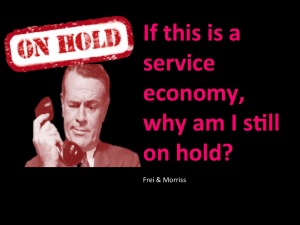Are You Ready for Service Excellence?
In December I had a problem with a well known ‘new’ UK bank. In their flagship local London store,

In December I had a problem with a well known ‘new’ UK bank. In their flagship local London store, my cards were cloned and overnight, all my money was extracted in Guatemala and Honduras. Their USP claim is that they don’t have traditional bank rules and poor service. It was a car crash of system to get my money back; I was on hold for 3 hours. Consider Howard Schultz talking about Starbucks,
At our core, we’re a coffee company, but the opportunity we have to extend the brand is beyond coffee; it’s entertainment.
It’s 2015 and we really do live in a service economy. In most western countries, service accounts for more than 75% of GDP, a share which will continue to increase. Service is therefore important for all types of companies, because they now compete primarily on the service that they provide.
So why is there so much bad service? Why do so many companies struggle to deliver even the most basic services let alone give great entertainment (except in not doing what they claim is their USP)? If all companies effectively compete on service, the key differentiator then lies in the service management model and the ability to execute it. The key reasons why a service company fails to deliver excellent service are:
- The Knowledge Gap. They don’t know or understand what the customer expects.
- The Design and Standards Gap. They don’t have the right service designs, processes or systems to execute a plan.
- The Performance Gap. They are not delivering to its own service standards and rarely show Excellence, always.
- The Communication Gap. They are not matching performance to service promises – expectations and values are not explained.
So what is the basis of service excellence? Leadership and culture now play a greater role in effective service organisations today than ever before. Many claim to have cracked this particular problem. Some suggest that excellent service is where service is:
- reliable
- timely
- personalised
- memorable
- unnoticeable
- remarkable
The trouble is that this has such a narrow focus on how service is delivered (the internal processes ) or on the service itself. It is also very short sighted and exists in a world that no longer exists. Service Excellence can be understood by this simple function (taken from Service Management 3.0 – the next generation of service by Morten Kamp Andersen and Peter Ankerstjerne)
Excellent Service = Customer Perception minus Customer Expectation
When customers evaluate a service they will compare their perception of the actual delivered service to what they think it should be. This process is often done at a sub-conscious emotional level. So try this de-stilled formula (with help from Tom Peter’s Excellence Paper ) and apply a small droplet of wisdom:
- Excellence, always. From now on do nothing less than excellence behaviour. The small stuff matters and you can change everything with this philosophy.Don’t forget to tuck the shower curtain into the bath tub. —Conrad Hilton
- Great Execution of the Emotional Signature Do more than is required, and remember Drucker’s view on great leadership: They do … ONE BIG THING at a time.
- Positively Engage with your customers at every opportunity. Your plan for engagement is meaningless without excellent execution.
Execution is strategy —Fred Malek
- First Class Communication is vital because your customers want to feel valued and respected. They’re also looking for peace of mind that they can trust you will deliver what you promise
- Understand Your Market and anticipating your customers’ changing needs will enable you to think and stay ahead of the competition. Monitoring the wider economy and analysing how changes will impact your customers. They should be your number #1 focus always.
- Get Current Feedback from survey and asking great questions so you get an honest assessment of your business from the people that matter – your clients.
- Flexibility and Innovation so your clients get exactly what they want, in their way, every time. Exceed expectations and make their lasting memory amazing.
- Mentoring encourage staff members at all levels to mentor newer team members. Not only does it give them pride and drive to unlock other people’s talents, it develops stronger teams.
If you want staff to give great service, give great service to staff —Ari Weinzweig
- Have an Amazing Training Programme so that staff can see how their development will progress step by step. Service companies who desire to be excellent, do not only have great people, they also have great processes for how to induct, introduce, train, manage, develop and promote these people.They have a system and a culture of processes which are founded on a great respect for human character and a belief that an individual can do wonders if he/she is just provided with the right tools and management processes.
Believe the difference the little unexpected extra can make. It can come in different shapes and forms, such as a smile, a positive and fun remark, random acts of kindness or the additional effort by the service professional going the extra mile. The old models of service are are no longer sufficient. Their future focus should be on the service delivery system and the power of the human touch. Frontline service employees should be empowered to create appreciated service moments and through their service performance influence and preferably leverage the purpose of the customer organisation.
Maybe take on board Tom Peter’s wonderful formula:
K = R = P (Kindness = Repeat business = Profit.)
EXCELLENCE. Now. EXCELLENCE. Always. Thanks Tom.
Categories: : blog
 Sarah Jons
Sarah Jons 